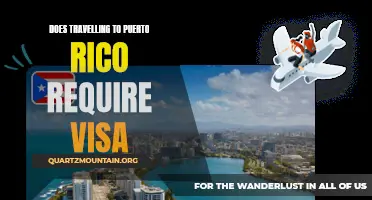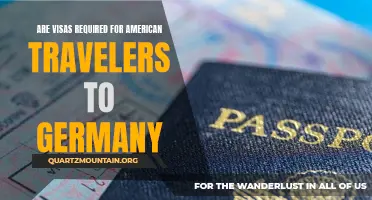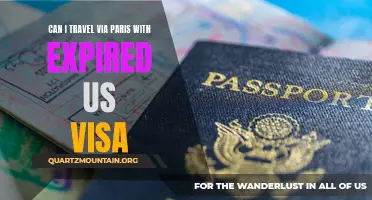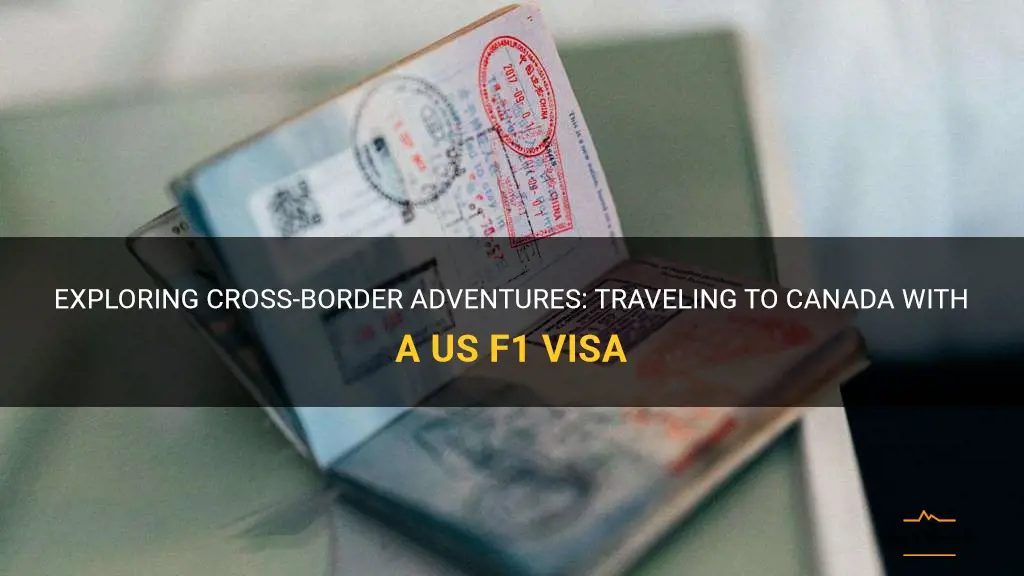
Have you ever dreamed of visiting Canada but thought it would be impossible because you are in the United States on an F1 visa? Well, think again! With a little planning and preparation, you can embark on a cross-border adventure and explore all that Canada has to offer. In this article, we will delve into the details of traveling to Canada with an F1 visa, including visa requirements, necessary documents, and tips for a smooth and enjoyable journey. So pack your bags and get ready to experience the beauty and diversity of our northern neighbor!
What You'll Learn
- Is it possible to travel to Canada with a US F1 visa?
- What are the specific requirements for traveling to Canada with a US F1 visa?
- Are there any restrictions or limitations on travel within Canada with a US F1 visa?
- How long can you stay in Canada with a US F1 visa?
- Are there any additional documents or permissions needed to enter Canada with a US F1 visa?

Is it possible to travel to Canada with a US F1 visa?
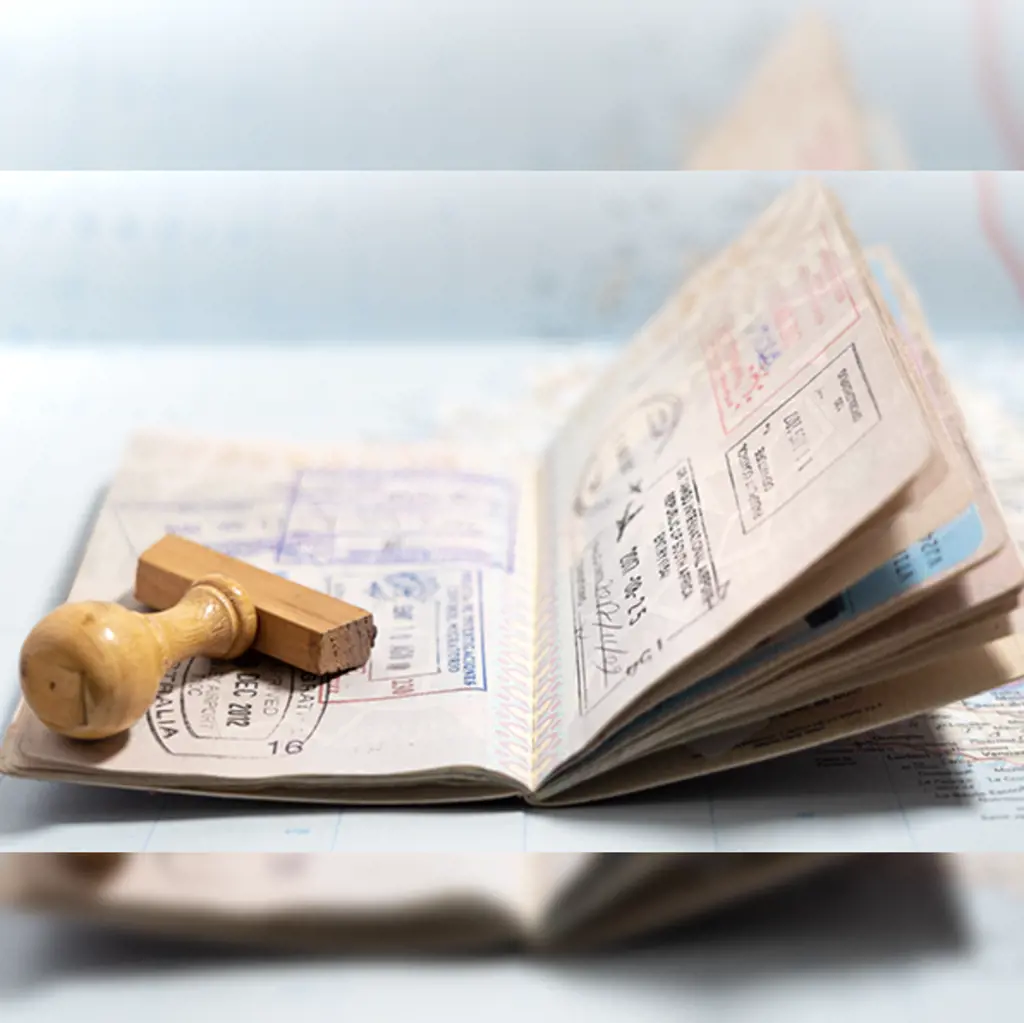
Many international students in the United States on an F1 visa may be interested in visiting Canada while they are studying. Canada is a popular destination known for its natural beauty, vibrant cities, and quality education institutions. However, the question arises if it is possible to travel to Canada with a US F1 visa.
The short answer is yes, it is possible to travel to Canada with a US F1 visa. However, there are a few important things to keep in mind before planning your trip.
Firstly, it is essential to check if you require a visa to enter Canada. Depending on your country of citizenship, you may be exempt from needing a visa or may require an Electronic Travel Authorization (eTA). US citizens, for example, do not need a visa or an eTA to enter Canada as tourists or for short-term studies.
If you are not a US citizen, it is important to check the Canadian government's website or consult with the Canadian consulate in your country to determine what requirements you need to meet to enter Canada.
Next, you'll need to ensure that your US F1 visa is still valid. Your visa should be valid for re-entry into the United States after visiting Canada. It's always a good idea to check the expiration date on your visa and to make sure it will still be valid when you plan to return to the United States.
Additionally, it is also recommended to carry your I-20 form, which is a document issued by your US educational institution. This form verifies that you are a student and that you are maintaining your legal status in the United States. It may be asked for at both the US-Canada border and at the US border when you return.
Furthermore, it is important to be aware of any travel restrictions or advisories that may be in place. Due to the ongoing COVID-19 pandemic, travel restrictions and requirements may vary. It is crucial to stay updated with the latest information from both the US and Canadian governments regarding travel regulations.
To enter Canada, you may need to provide additional documentation, such as proof of enrollment in your US educational institution, a letter of explanation for your visit, financial proof of your ability to support your stay in Canada, and proof of ties to your home country to demonstrate that you intend to return to the US after your visit.
When crossing the US-Canada border, it is important to be prepared for potential questioning and inspection. The border officers may ask about the purpose of your visit, the duration of your stay, and your plans while in Canada. It is advisable to answer truthfully and provide any necessary documents requested.
In conclusion, it is indeed possible to travel to Canada with a US F1 visa. However, it is crucial to research and understand the specific requirements and restrictions that may apply to your situation. It is always recommended to check the official government websites and consult with the appropriate authorities to ensure a smooth and hassle-free trip to Canada.
Can Dependent Travel on a Previous Employer's H4 Visa?
You may want to see also

What are the specific requirements for traveling to Canada with a US F1 visa?

If you are an international student studying in the United States on an F1 visa and you are planning to travel to Canada, there are specific requirements that you must fulfill in order to enter Canada. Here are the steps you need to follow:
Step 1: Check your F1 visa validity:
Before planning your trip to Canada, it is important to ensure that your F1 visa is still valid. Canadian immigration authorities require a valid visa for entry into the country. If your F1 visa has expired or is close to expiring, you may need to apply for a new visa before traveling.
Step 2: Apply for a Canadian visa:
In addition to your F1 visa, you will need to apply for a Canadian visa in order to enter the country. The type of visa you need will depend on the purpose of your visit to Canada. For example, if you are visiting as a tourist, you may need a visitor visa, while if you are attending a conference or a study program in Canada, you may need a temporary resident permit.
Step 3: Gather the required documents:
When applying for a Canadian visa, you will need to provide certain documents to support your application. These may include:
- Valid passport: Ensure that your passport is valid for at least six months beyond your planned date of departure from Canada.
- Proof of funds: Provide evidence that you have enough financial resources to cover your expenses during your stay in Canada.
- Letter of enrollment: Obtain a letter from your US educational institution confirming your enrollment as a student.
- Letter of invitation: If you have been invited to Canada by a Canadian educational institution, conference, or event, you will need a letter of invitation.
Step 4: Apply for a Temporary Resident Visa:
Once you have gathered all the required documents, you can apply for a Canadian Temporary Resident Visa. You can submit the application online or by mail. Make sure to follow the instructions provided and pay the required fees.
Step 5: Plan your travel itinerary:
While planning your trip to Canada, make sure to consider your itinerary carefully. If you plan to visit multiple cities in Canada, consider the logistics of transportation and accommodation. It is recommended to book your flights and accommodations in advance to ensure availability and better prices.
Step 6: Arrive at the Canadian border:
When you arrive at the Canadian border, you will need to present your F1 visa, Canadian visa, and other supporting documents to the Canadian immigration officer. Be prepared to answer questions about the purpose of your visit, your intended length of stay, and your plans for returning to the United States.
Examples:
- Sarah is an international student from China studying in the United States on an F1 visa. She plans to attend a summer program at a Canadian university. Sarah checks her F1 visa expiration date and finds that it is still valid. She applies for a Canadian visitor visa and gathers all the required documents, including her valid passport, letter of enrollment, and proof of funds. After applying for a Temporary Resident Visa, Sarah books her flights and accommodations in Canada. When she arrives at the Canadian border, she presents her F1 visa and her Canadian visa to the immigration officer, who asks her a few questions about her purpose of visit and her plans for returning to the US. Sarah is allowed to enter Canada and attends her summer program successfully.
- John is an international student from India studying in the United States on an F1 visa. He wants to visit his cousin in Canada during his summer break. However, he realizes that his F1 visa is about to expire. John applies for a new F1 visa first, and once he receives it, he proceeds to apply for a Canadian visitor visa. He gathers all the required documents and submits his application. Unfortunately, his Canadian visa application is rejected due to a lack of sufficient proof of funds. John decides to postpone his trip to Canada until he can gather the necessary funds and reapply for a Canadian visa. He learns from the experience that it is important to carefully prepare all the required documents and meet the financial requirements when applying for a Canadian visa.
In conclusion, traveling to Canada with a US F1 visa requires fulfilling specific requirements such as having a valid F1 visa and obtaining a Canadian visa. By following the steps outlined above and carefully preparing the required documents, international students can successfully travel to Canada and enjoy their visit.
Can a Spouse Travel with B1 Visa While Waiting for I130 Approval?
You may want to see also

Are there any restrictions or limitations on travel within Canada with a US F1 visa?
Traveling within Canada with a US F1 visa can be an exciting opportunity for international students. However, it is important to understand that there are certain restrictions and limitations that may apply in this situation. In this article, we will explore these limitations and provide some helpful information for students planning to travel within Canada.
Firstly, it is important to note that the F1 visa is specifically designed for studying in the United States. While it grants you the ability to travel within the US, it does not necessarily provide the same privileges in other countries. In the case of traveling to Canada, you would typically need to obtain a separate visa or an Electronic Travel Authorization (eTA) before your trip.
The Canadian eTA is an electronic document that allows non-Canadians to enter and travel within Canada for tourism, business, or study purposes. It is valid for up to five years or until the expiration of your passport, whichever comes first. However, it is important to note that the eTA alone does not authorize you to study or work in Canada. For that purpose, you would need to obtain a study permit.
For international students studying in the United States on an F1 visa, there are a few scenarios to consider when traveling to Canada. If you are traveling to Canada for a short visit of less than six months and you are maintaining your full-time student status in the US, you may be able to visit Canada without a study permit. However, it is important to have the necessary supporting documents, such as your passport, visa, I-20 form, and proof of financial support, to present at the Canadian border.
On the other hand, if you are planning to study or work in Canada for more than six months, you will need to apply for a study permit. The study permit is a document issued by the Canadian government that allows international students to study at a designated learning institution in Canada. It is important to apply for a study permit well in advance of your intended start date, as processing times can vary.
It is worth noting that there may be additional requirements and restrictions imposed by the Canadian government, such as proof of health insurance coverage and a biometric test. It is important to thoroughly research and understand the specific requirements based on your individual circumstances before making any travel plans.
In conclusion, while traveling within Canada with a US F1 visa is possible, there are certain restrictions and limitations that apply. It is important to obtain the necessary visa or travel authorization, such as an eTA, and, if necessary, a study permit, before traveling to Canada. It is recommended to thoroughly research the requirements and restrictions imposed by the Canadian government and have all the necessary supporting documents in order to ensure a smooth and hassle-free travel experience.
Exploring the Possibility of Traveling on a Bridging Visa Canada
You may want to see also

How long can you stay in Canada with a US F1 visa?
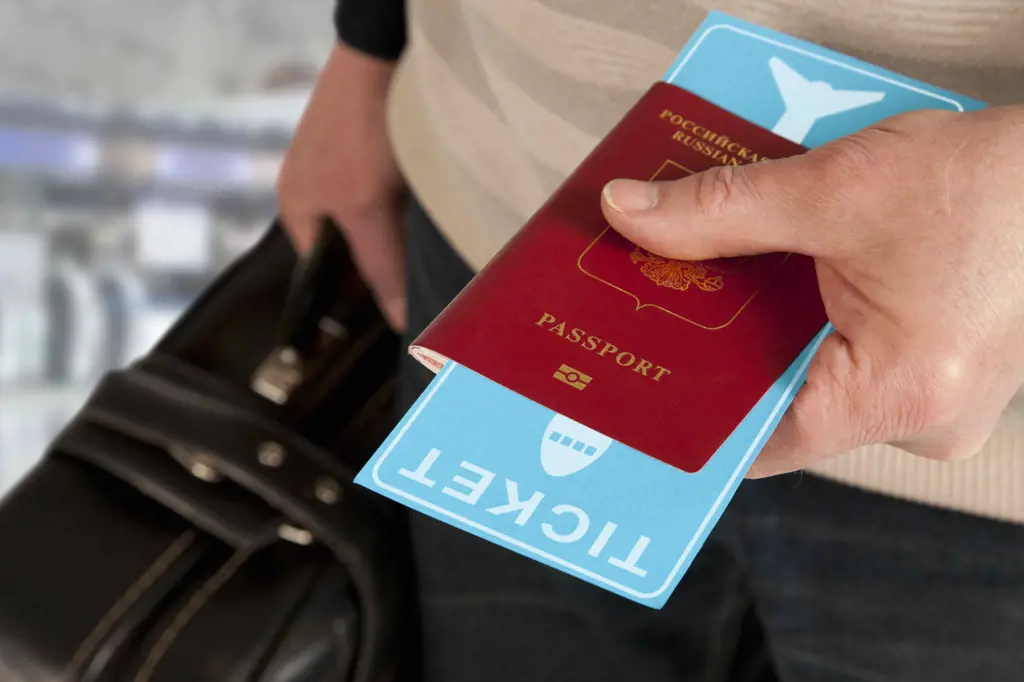
As an international student, you may have questions about how long you can stay in Canada with a US F1 visa. This article will provide you with information regarding the duration of your stay in Canada and the regulations surrounding your visa.
The F1 visa is primarily meant for students who are studying in the United States. However, it is possible for F1 visa holders to travel to Canada and stay for a limited period of time. The duration of your stay in Canada with a US F1 visa depends on the purpose of your visit and the specific circumstances of your trip.
If you are planning to visit Canada for study-related purposes, such as attending a conference or workshop, you can typically stay in Canada for the duration of your event. However, you must ensure that you have the necessary documents to support your visit, such as a letter of invitation from the event organizers and proof of your student status in the United States.
For F1 visa holders who wish to visit Canada for tourism or personal reasons, such as a vacation or visiting friends and family, the maximum duration of stay is typically six months. However, it is essential to note that the final decision on how long you can stay in Canada rests with the Canadian immigration officer at the port of entry. The officer will assess your intentions, ties to your home country, and overall admissibility to Canada. Therefore, it is important to be prepared and present all relevant documents and information to support your visit.
To enter Canada with a US F1 visa, you will need to satisfy the the same entry requirements as other visitors. This includes having a valid passport, a valid F1 visa, and sufficient funds to cover your stay in Canada. Additionally, you may also need to obtain an Electronic Travel Authorization (eTA) if you are arriving by air. The eTA can be easily obtained online and is mandatory for visa-exempt visitors entering Canada by air.
It is crucial to mention that overstaying your authorized period of stay in Canada can have serious consequences on your future travel plans. It can result in being denied entry into Canada in the future or having restrictions placed on future visits. Therefore, it is essential to comply with the regulations and ensure that you depart Canada before the expiration of your authorized stay.
In conclusion, with a US F1 visa, you can stay in Canada for study-related purposes for the duration of your event or for up to six months for tourism or personal reasons. However, the ultimate decision on how long you can stay in Canada rests with the Canadian immigration officer. Make sure to have all the necessary documents and information to support your visit and comply with the regulations to avoid any future travel restrictions.
Traveling to the Netherlands with a Schengen Visa: What You Need to Know
You may want to see also

Are there any additional documents or permissions needed to enter Canada with a US F1 visa?
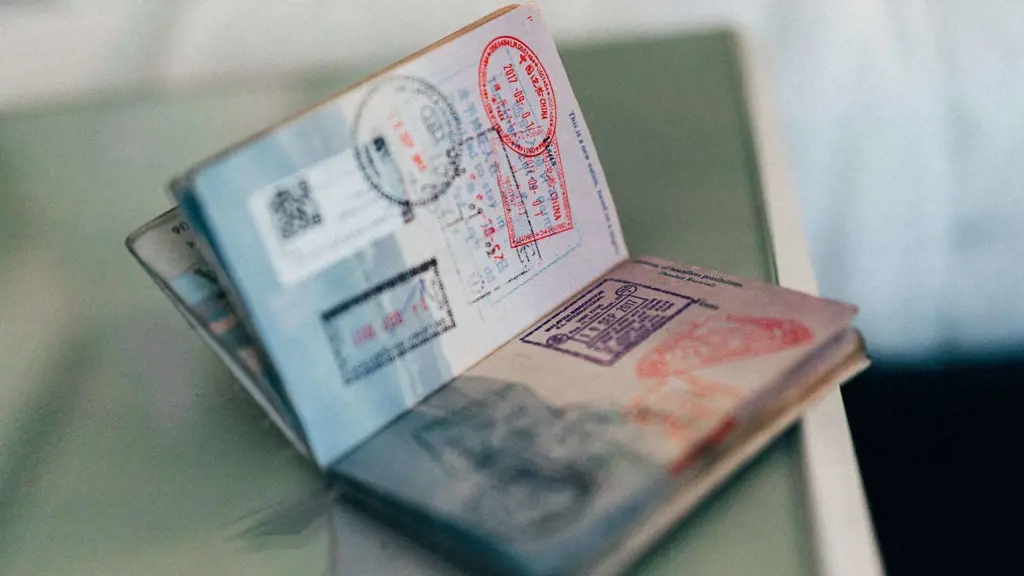
If you are a US F1 visa holder and planning to travel to Canada, it is important to be aware of the additional documents and permissions required to enter the country. While you may already possess a valid US visa, Canada has its own entry requirements that must be fulfilled. This article will guide you through the process of entering Canada with a US F1 visa, including the necessary documents and permissions.
- Passport: Before traveling to Canada, ensure that your passport is valid for at least six months beyond your intended stay. This is a standard requirement for most countries and is applicable in Canada as well.
- Temporary Resident Visa (TRV): Citizens of certain countries may require a Temporary Resident Visa, also known as a visitor visa, to enter Canada. The United States is exempt from this requirement, so US citizens with a valid passport do not need a TRV to enter Canada.
- Electronic Travel Authorization (eTA): While US citizens are exempt from obtaining a TRV, they do need to apply for an Electronic Travel Authorization if traveling to Canada by air. The eTA is a simple online application process that requires basic biographical information and a fee. Once approved, the eTA is valid for multiple entries into Canada for up to five years or until your passport expires, whichever comes first.
- Proof of Funds: It is a good practice to carry proof of sufficient funds to cover your stay in Canada. This can include bank statements, credit cards, traveler's checks, or a letter of financial support if someone else is financially sponsoring your trip.
- Travel Itinerary: Prepare a detailed travel itinerary, including your intended places of accommodation, transportation arrangements, and any planned activities or attractions you wish to visit in Canada. Immigration officials may ask for this information upon arrival.
- Letter of Enrollment: As an F1 visa holder, it is advisable to carry a letter of enrollment issued by your US educational institution. This letter should state your current enrollment status, expected graduation date, and the purpose of your visit to Canada.
- Health Insurance: It is highly recommended to have adequate health insurance coverage while traveling abroad. While the Canadian healthcare system provides excellent care for residents and citizens, it may not cover non-residents or visitors. Therefore, having travel insurance that includes medical coverage is crucial.
Upon arrival at a Canadian port of entry, you will go through immigration checkpoints where you will be required to present your passport, US visa, and other documents mentioned above. The immigration officers may ask questions about your purpose of visit, duration of stay, and any other relevant details. It is important to answer truthfully and provide any requested supporting documents.
In some cases, immigration officers may also require additional documentation or proof of ties to your home country to ensure that you do not have any intentions to overstay your welcome in Canada. This could include proof of employment, property ownership, or family ties back home.
It is essential to note that entry requirements can vary depending on the individual circumstances and the discretion of the immigration officer. Therefore, it is always a good idea to check the official website of Immigration, Refugees and Citizenship Canada (IRCC) for the latest and most accurate information regarding entry requirements for visitors from specific countries.
In conclusion, while holding a valid US F1 visa allows you to study in the United States, entering Canada as a visitor requires additional documents and permissions. Make sure to have a valid passport, apply for an eTA if traveling by air, carry proof of funds, a letter of enrollment, travel insurance, and a detailed travel itinerary. Adhering to these requirements will help ensure a smooth entry into Canada, allowing you to enjoy your visit to the country hassle-free.
Can I Travel to Qatar with a UAE Residence Visa?
You may want to see also
Frequently asked questions
Yes, you can travel to Canada with a US F1 visa.
No, if you hold a valid US F1 visa, you do not need a separate visa to visit Canada.
Yes, in addition to your valid US F1 visa, you may need to obtain an Electronic Travel Authorization (eTA) if you are traveling to Canada by air. However, if you are traveling by land or sea, you do not need an eTA.
The duration of your stay in Canada with a US F1 visa will depend on the immigration officer's discretion. Generally, you are allowed to stay for the duration of your authorized stay in the US, or up to six months, whichever is shorter. It is important to check the specific visa requirements and regulations before traveling to Canada.


